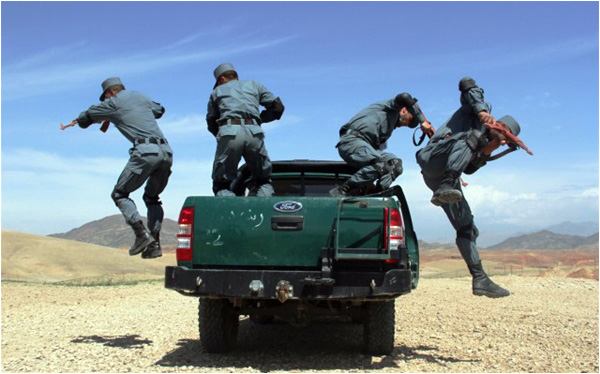
A suicide blast in Kabul last week resulted in 64 deaths while more than 300 people were injured. A truck laden with explosives rammed into a security forces compound in the morning, resulting in deaths of scores of civilians along with security officials.
It was the latest in a series of attacks launched by the Afghan Taliban as part of their spring offensive, which has been named after their late leader Mullah Omer this year. On February 27, scores of people died in two same-day attacks, one on the Defense Ministry in Kabul, and other on a pro-government tribal elder in Kunar province. In January, a bus carrying employees of the local Tolo TV channel was attacked, resulting in seven deaths. The Taliban had kept the Afghan government busy throughout the winter as well.
Last week’s attack gave the Afghan president an opportunity to discontinue the impending internationally-brokered peace talks between Taliban and the Afghanistan government, signaling that that was perhaps the purpose of the attack to begin with. Understandably, the peace talks will resume after some time. But the attacks will continue unabated too. This strategy by the Afghan Taliban raises too many significant questions. Are the negotiations just a way to gain time? Will the Taliban even be willing to become part of the coalition that seems to be the future of Afghanistan? And last and the most important, are the suicide attacks a desperate attempt to impose a bloody bargain to have a sizable share of the pie?
Taliban’s rise was more meteoric than even that of ISIS recently – a couple of thousand energetic seminary students seizing the weapons depot of Spin Baldok and capturing Kandahar in no time. Before their human rights abuses and hosting Al Qaeda, they restored order and normalized commerce bringing a temporary respite to the beleaguered Afghans. But that was 1996. The warlords were fatigued, isolated and clueless. Taliban were outsiders who exploited the opportunity with agility and surprise. In 2016, the Taliban are fatigued, isolated and clueless. Now they are not the outsiders, and there are no cities available to capture and hold. Even the towns like Kanduz in the hinterlands are swiftly and effectively recaptured. That has made Taliban fall back to suicide bombings.
Suicide attacks have never been a popular battle tactic in Afghanistan, even though in other parts of the world, groups like Hezbollah and the LTTE had perfected them in the 1980s and 1990s. The Taliban relied mostly on guerilla warfare, which is always more promising for the group and more ominous for the enemy. The assassination of rival Tajik commander Ahmed Shah Massoud days before 9/11 was the first suicide attack executed by Al Qaeda in Afghanistan to the benefit of the Taliban. They did not get to celebrate too much, because of the immediate reprisals after 9/11.
It has been a decade and a half since their regime was toppled and Mullah Omer left Kabul on a motorcycle. Now, both Osama bin Laden and Mullah Omer are dead, and a new Afghan regime is in power, having taken over from the earlier Karzai dispensation. The government in Afghanistan can hardly be called stable and independent. Its tenuous financial situation and shaky internal security have resulted in heavy reliance on international actors. But does that offer any prospect for the Taliban? It appears that even the Taliban do not see any prospect for themselves.

Suicide bombings have been used by nationalist movements as well as trans-national terrorists. For those fighting an insurgency, it is one of the means towards a larger strategic end. Hezbollah pioneered the tactic with the bombing of US and French barracks in 1983, but stopped it after some time. The LTTE, despite assassinating Indian and Sri Lankan prime ministers in the 1990s, fell back to guerilla warfare and provision of public goods and support systems, until the death of their leader Velupillai Prabhakaran and their subsequent surrender. The same is the case with the Kurds, Hamas and many other groups who sustain their insurgency with social services, political involvement and international diplomacy. Taliban do not seem to be interested in any of these, and that makes them the total maximalist spoiler on the bargaining table, whenever that table will be set again.
Taliban have never known to be fond of negotiations. From snubbing the influential Saudi intelligence chief Prince Turki al Faisal, to alienating neutral countries with the bombing of Bamiyan structures, they have exhibited conspicuous distaste for diplomacy and persuasion, power sharing, and even modest governance. In a country of multiple ethnicities where factionalism is common and literacy has been rising after a decade and a half of relative calm, Taliban only represent a segment of the religious and tribal Pashtun population from the South. But they aim at ruling the entire country. This could have been possible with their military strength, but that seems unlikely now.
Seeing little chance in the open battlefield, they have resorted to occasional suicide bombings and assassinations, which even the senseless TTP has managed to carry on sporadically without getting anywhere. Only time will tell that how much this bloody bargaining will pay off for the Afghan Taliban, but it is now apparent that violence for the sake of violence is a zero sum game. Sporadic suicide attacks without ensuing political advances will reduce the Taliban to just another terrorist group, capable of creating chaos but not able to consolidate.
It was the latest in a series of attacks launched by the Afghan Taliban as part of their spring offensive, which has been named after their late leader Mullah Omer this year. On February 27, scores of people died in two same-day attacks, one on the Defense Ministry in Kabul, and other on a pro-government tribal elder in Kunar province. In January, a bus carrying employees of the local Tolo TV channel was attacked, resulting in seven deaths. The Taliban had kept the Afghan government busy throughout the winter as well.
Last week’s attack gave the Afghan president an opportunity to discontinue the impending internationally-brokered peace talks between Taliban and the Afghanistan government, signaling that that was perhaps the purpose of the attack to begin with. Understandably, the peace talks will resume after some time. But the attacks will continue unabated too. This strategy by the Afghan Taliban raises too many significant questions. Are the negotiations just a way to gain time? Will the Taliban even be willing to become part of the coalition that seems to be the future of Afghanistan? And last and the most important, are the suicide attacks a desperate attempt to impose a bloody bargain to have a sizable share of the pie?
Taliban’s rise was more meteoric than even that of ISIS recently – a couple of thousand energetic seminary students seizing the weapons depot of Spin Baldok and capturing Kandahar in no time. Before their human rights abuses and hosting Al Qaeda, they restored order and normalized commerce bringing a temporary respite to the beleaguered Afghans. But that was 1996. The warlords were fatigued, isolated and clueless. Taliban were outsiders who exploited the opportunity with agility and surprise. In 2016, the Taliban are fatigued, isolated and clueless. Now they are not the outsiders, and there are no cities available to capture and hold. Even the towns like Kanduz in the hinterlands are swiftly and effectively recaptured. That has made Taliban fall back to suicide bombings.
There are no cities available to capture and hold
Suicide attacks have never been a popular battle tactic in Afghanistan, even though in other parts of the world, groups like Hezbollah and the LTTE had perfected them in the 1980s and 1990s. The Taliban relied mostly on guerilla warfare, which is always more promising for the group and more ominous for the enemy. The assassination of rival Tajik commander Ahmed Shah Massoud days before 9/11 was the first suicide attack executed by Al Qaeda in Afghanistan to the benefit of the Taliban. They did not get to celebrate too much, because of the immediate reprisals after 9/11.
It has been a decade and a half since their regime was toppled and Mullah Omer left Kabul on a motorcycle. Now, both Osama bin Laden and Mullah Omer are dead, and a new Afghan regime is in power, having taken over from the earlier Karzai dispensation. The government in Afghanistan can hardly be called stable and independent. Its tenuous financial situation and shaky internal security have resulted in heavy reliance on international actors. But does that offer any prospect for the Taliban? It appears that even the Taliban do not see any prospect for themselves.

Suicide bombings have been used by nationalist movements as well as trans-national terrorists. For those fighting an insurgency, it is one of the means towards a larger strategic end. Hezbollah pioneered the tactic with the bombing of US and French barracks in 1983, but stopped it after some time. The LTTE, despite assassinating Indian and Sri Lankan prime ministers in the 1990s, fell back to guerilla warfare and provision of public goods and support systems, until the death of their leader Velupillai Prabhakaran and their subsequent surrender. The same is the case with the Kurds, Hamas and many other groups who sustain their insurgency with social services, political involvement and international diplomacy. Taliban do not seem to be interested in any of these, and that makes them the total maximalist spoiler on the bargaining table, whenever that table will be set again.
Taliban have never known to be fond of negotiations. From snubbing the influential Saudi intelligence chief Prince Turki al Faisal, to alienating neutral countries with the bombing of Bamiyan structures, they have exhibited conspicuous distaste for diplomacy and persuasion, power sharing, and even modest governance. In a country of multiple ethnicities where factionalism is common and literacy has been rising after a decade and a half of relative calm, Taliban only represent a segment of the religious and tribal Pashtun population from the South. But they aim at ruling the entire country. This could have been possible with their military strength, but that seems unlikely now.
Seeing little chance in the open battlefield, they have resorted to occasional suicide bombings and assassinations, which even the senseless TTP has managed to carry on sporadically without getting anywhere. Only time will tell that how much this bloody bargaining will pay off for the Afghan Taliban, but it is now apparent that violence for the sake of violence is a zero sum game. Sporadic suicide attacks without ensuing political advances will reduce the Taliban to just another terrorist group, capable of creating chaos but not able to consolidate.

